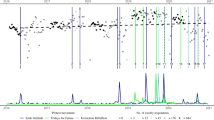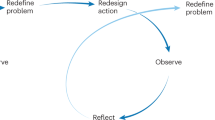Abstract
What type of common asylum regime would Europeans support? We conducted a survey asking 18,000 citizens of 15 European countries about their preferences regarding different mechanisms for allocating asylum seekers across countries. A large majority supports an allocation that is proportional to each country’s capacity over the status quo policy of allocation based on the country of first entry. This majority support is weakened but persists even among a randomly assigned subset of respondents who were made aware that moving to proportional allocation would increase the number of asylum seekers allocated to their own country. These results suggest that citizens care deeply about the fairness of the responsibility-sharing mechanism, rather than only the consequences of the asylum policy. The findings also highlight a potential pathway towards reform of the Common European Asylum System.
This is a preview of subscription content, access via your institution
Access options
Access Nature and 54 other Nature Portfolio journals
Get Nature+, our best-value online-access subscription
$29.99 / 30 days
cancel any time
Subscribe to this journal
Receive 12 digital issues and online access to articles
$119.00 per year
only $9.92 per issue
Buy this article
- Purchase on Springer Link
- Instant access to full article PDF
Prices may be subject to local taxes which are calculated during checkout



Similar content being viewed by others
References
Operational Portal Refugee Situations: Mediterranean Situation (UNHCR, 2016); http://data.unhcr.org/mediterranean/regional.php
Raitio, J. The Principle of Legal Certainty in EC Law (Kluwer Academic, 2003).
Ngalikpima, M. & Hennessy, M. “Dublin II Regulation: Lives on Hold”—European Comparative Report (European Council on Refugees and Exiles, 2013); http://www.refworld.org/docid/513ef9632.html
McDonough, P., Kmak, M. & van Selm, J. Sharing Responsibility for Refugee Protection in Europe: Dublin Reconsidered (European Council on Refugees and Exiles, 2008).
Neumayer, E. Asylum destination choice. What makes some West European countries more attractive than others? Eur. Union Polit. 5, 155–180 (2004).
Bozorgmehr, K. & Wahedi, K. Reframing solidarity in europe: frontex, frontiers, and the fallacy of refugee quota. Lancet Public Health 2, e10–e11 (2016).
Thielemann, E. R. Between interests and norms: explaining burden-sharing in the European Union. J. Refug. Stud. 16, 253–273 (2003).
Communication from the Commission to the European Parliament, the Council, the European Economic and Social Committee and the Committee of the Regions: A European Agenda on Migration (European Commission, 2015); http://ec.europa.eu/anti-trafficking/sites/antitrafficking/files/communication_on_the_european_agenda_on_migration_en.pdf
Suhrke, A. Burden-sharing during refugee emergencies: the logic of collective versus national action. J. Refug. Stud. 11, 396–415 (1998).
Betts, A. Public goods theory and the provision of refugee protection: the role of the joint-product model in burden sharing theory. J. Refug. Stud. 16, 274–296 (2003).
Thielemann, E. R. & Dewan, T. The myth of free-riding: refugee protection and implicit burden-sharing. West Eur. Polit. 29, 351–369 (2006).
Fetzer, J. S. Public Attitudes Toward Immigration in the United States, France, and Germany (Cambridge Univ. Press, 2000).
Ivarsflaten, E. Threatened by diversity: why restrictive asylum and immigration policies appeal to Western Europeans. J. Elect. Public Opin. Parties 15, 21–45 (2005).
Wike, R., Stokes, B. & Simmons, K. Europeans fear wave of refugees will mean more terrorism, fewer jobs. Pew Research Center (11 July 2016); http://www.pewglobal.org/2016/07/11/europeans-fear-wave-of-refugees-will-mean-more-terrorism-fewer-jobs
Bansak, K., Hainmueller, J. & Hangartner, D. How economic, humanitarian, and religious concerns shape European attitudes toward asylum seekers. Science 354, 217–222 (2016).
Bechtel, M. M. & Scheve, K. F. Mass support for global climate agreements depends on institutional design. Proc. Natl Acad. Sci. USA 110, 13763–13768 (2013).
Hainmueller, J. Entropy balancing for causal effects: a multivariate reweighting method to produce balanced samples in observational studies. Polit. Anal. 20, 25–46 (2011).
Gosepath, S. in The Stanford Encyclopedia of Philosophy (ed. Zalta, E. N. ) (The Metaphysics Research Lab, 2011); https://plato.stanford.edu/archives/spr2011/entries/equality/
Moulin, H. in Handbook of Social Choice and Welfare Vol. 1 (eds Arrow, K., Sen, A. K. & Suzumura, K.) 289–357 (Elsevier, 2002).
Gachter, S. & Riedl, A. Dividing justly in bargaining problems with claims. Soc. Choice Welf. 27, 571–594 (2006).
Herrero, C., Moreno-Ternero, J. D. & Ponti, G. On the adjudication of conflicting claims: an experimental study. Soc. Choice Welf. 34, 145–179 (2010).
Bosmans, K. & Schokkaert, E. Equality preference in the claims problem: a questionnaire study of cuts in earnings and pensions. Soc. Choice Welf. 33, 533–557 (2009).
Acknowledgements
We acknowledge funding from the Swiss National Science Foundation (grant #100017_159820), which enabled data collection, and the Ford Foundation for operational support of the Immigration Policy Lab. The funders had no role in study design, data collection and analysis, decision to publish or preparation of the manuscript. We thank T. Huddleston, D. Laitin, D. Lawrence, R. Reich and J. Spirig for helpful advice.
Author information
Authors and Affiliations
Contributions
K.B., J.H. and D.H. conceived the research, designed the analyses, conducted the analyses and wrote the manuscript.
Corresponding author
Ethics declarations
Competing interests
The authors declare no competing interests.
Supplementary information
Supplementary Information
Supplementary Methods, Supplementary Discussion, Supplementary Tables (1–30), Supplementary Figures 1–7, Supplementary References (PDF 483 kb)
Rights and permissions
About this article
Cite this article
Bansak, K., Hainmueller, J. & Hangartner, D. Europeans support a proportional allocation of asylum seekers. Nat Hum Behav 1, 0133 (2017). https://doi.org/10.1038/s41562-017-0133
Received:
Accepted:
Published:
DOI: https://doi.org/10.1038/s41562-017-0133
This article is cited by
-
Exploring the news media-dark personality nexus: Linking television news consumption, the Dark Triad, and perceived refugee threat
Current Psychology (2024)
-
Europeans’ support for refugees of varying background is stable over time
Nature (2023)
-
Refugee allocation mechanisms: theory and applications for the European Union
Operational Research (2022)
-
Vaccine alliance building blocks: a conjoint experiment on popular support for international COVID-19 cooperation formats
Policy Sciences (2021)
-
Attitudes towards climate change migrants
Climatic Change (2020)



